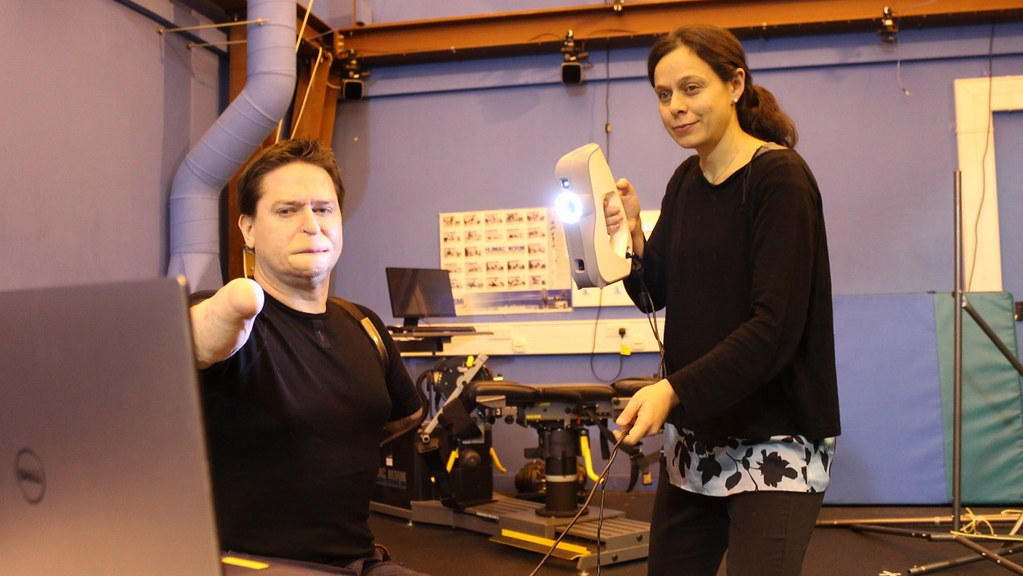Individuals who require prosthetic limbs to be fitted following amputations are set to benefit from new technology being developed by researchers at the University of Bath.
The work is part of the TIDAL N+ project, which is led by UCL’s Global Disability Innovation Hub and funded by the EPSRC.
If you have an amputation and require a prosthetic limb you need a socket fitted. This is the interface which connects the prosthetic to the residual limb (sometimes known as the stump). However, sizing and fitting the right socket can take months and require multiple trips back and forth to hospital, as the stump can change size and shape as it heals. This delay can seriously impair rehabilitation and quality of life.
Inspired by Alex
Take the case of Alex Lewis. In 2013, aged just 33, Alex contracted a rare form of invasive Group A Strep followed by septicaemia. This led to him having all four limbs amputated and facial reconstruction. Yet, 10 years on, Alex is now helping with this project hoping to improve support for people who find themselves in a similar position in the future.
He explains: “For me, the socket fit in Roehampton took between 4 and 5 weeks to get right. For an amputee though, you want to be wearing this prosthetic as soon as possible, to be able to regain your independence. It just took a long, long time and lots of interactions. It was a long and laboured process.”
Through the new collaborative project being led by Dr Nicola Bailey and Dr Elena Seminati, the team from Bath hopes to dramatically speed up this process. They believe this could have big impacts on patient rehabilitation in the UK and internationally, in particular across low- and middle-income countries.
In England, 45,000 people rely on prosthetic limbs, with more than 5,000 people each year having new lower-limb amputations. Globally, around 100 million people need a prosthetic limb. It’s estimated that around 80% of those across low and middle income countries don’t have access to appropriate support.
Speeding-up support
The researchers’ aim is to develop technology that can enable patients and their families to photograph the remaining residual limb remotely at home, for example using a mobile phone or digital camera. The goal is to replicate the results clinicians can get in specialist hospitals using high-end 3D scanners, but remotely and at a fraction of the cost.
Dr Elena Seminati from the University’s Department for Health has previously led work improving support for amputees over several years, including with the University’s Centre for the Analysis of Motion Capture (CAMERA). She explains how this approach could be beneficial both for patients and for clinicians.
She said: “For amputees, each socket needs to be personalised, so it fits the shape of the residual limb, and it has to be designed quickly so that patients are able to get back to a relatively normal life as soon as possible. Through this work we want to find ways to speed up this process so as to improve rehabilitation for patients.”
Dr Nicola Bailey from the Department of Mechanical Engineering, who will lead the work, added: “There is a huge potential for impact through this project. The numbers of people with amputations worldwide is growing, and we know they can face serious physical and psychosocial disabilities which compromise their quality of life.
“Prosthetics can certainly improve people’s independence and inclusion, but to maximise prosthetic users’ experience and comfort, a well-fitting prosthetic socket is vital. By trialling, testing and developing new technologies we hope to find ways to better support patients and to help them in the recovery process.”
Alex Lewis added: “My hope through this work is that we can cut the time period down to give patients a much better outcome.”
 Alex Lewis with Elena and Nicola on campus in 2023; also featured is Rosemary Court who manages The Alex Lewis Trust.
Alex Lewis with Elena and Nicola on campus in 2023; also featured is Rosemary Court who manages The Alex Lewis Trust.
Dr Nicola Bailey will join other grant awardees at a TIDAL N+ webinar on Thursday 16 March from 12-1pm to share more on this innovative project.
The event will explore how research projects will help to transform assistive tech (AT) towards an innovative, sustainable, and equitable future – with speakers introducing the research and engineering challenges they’ll be tackling, what they hope to achieve, and why it matters.
The Tidal N+ project is led by UCL’s Global Disability Innovation Hub with partners at Loughborough, Salford and Strathclyde universities, and is funded by EPSRC [EP/W00717/1] to support researchers across the UK to develop a range of new assisted living products and services.

